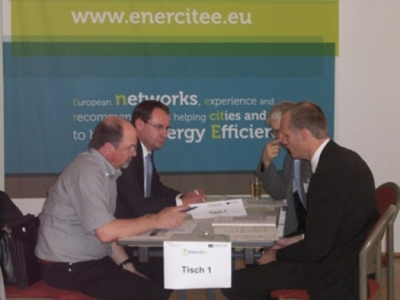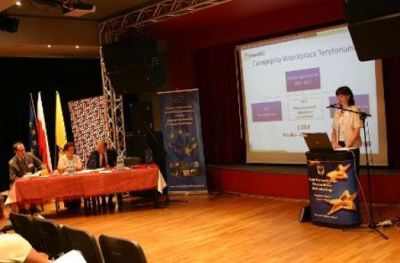Newsletter
- Issue VIII / November 2013
- Issue VII / June 2013
- Issue VI / February 2013
- Issue V / June 2012
- Issue IV / November 2011
- Issue III / July 2011
- Issue II / January 2011
-
Issue I / September 2010
- Editorial: Welcome note by Werner Sommer, representative of the Lead Partner
- A successful start for EnercitEE
- The sub-project priorities and the 1st Call for Proposals
- Regional kick-off events
- An introduction to Saxony
- An introduction to Smaland (Kalmar and Kronoberg)/Blekinge
- An introduction to Emilia-Romagna
- An introduction to Haute-Savoie
- An introduction to Crete
- An introduction to Lower Silesia
- EnercitEE: An overview
- Information and materials
Regional kick-off events
Kick-off events were held in all EnercitEE partner regions. On the one hand, the aims of the meetings were to promote the EnercitEE project and to provide information about its structure, targets and activities. On the other hand, the meetings gave the opportunity to specify the priorities of the 1st Call for Proposals and the related sub-projects. Interest was high in all regions.
Local authorities highlighted the importance of the thematic priorities of EnercitEE. Their only concerns were regarding reporting and controlling. Furthermore, some institutions mentioned the challenge of pre-financing the activities, since, under INTERREG IVC, funds are only made available once activities have been reported and related expenses have been clarified. All regional managers and the MPCO responded to the questions raised and demonstrated how potential challenges could be overcome.
Kick-off in Saxony

Saxony welcomed approximately 60 representatives from municipalities, universities, NGOs and energy agencies to the kick-off meeting in Dresden on 8th June 2010. Following the presentations, interested parties could present their sub-project ideas to the organisers. The challenges and opportunities facing applicants were discussed. The overall feedback after the event was very positive and increased Saxony’s expectations of carrying out a successful project.
Kick-off in Smaland (Kalmar and Kronoberg)/Blekinge
In June, the ESS held kick-off meetings in each of the three Swedish counties involved in the EnercitEE project. The project was presented by Mia Stavert and Hans Gulliksson from the ESS. Around 70 people participated in the three different meetings. Participants included municipalities from the counties of Blekinge, Kalmar and Kronoberg, as well as various other local and regional organisations interested in participating in sub-projects.
Kick-off in Emilia-Romagna

The Energy Policy Department of the Emilia-Romagna Region and ASTER organised an information day meeting on 15th July 2010. More than 30 participants took part (among others municipalities, universities and research centres, energy agencies, consulting companies and develop-ment agencies). The key issues of the first part of the day included the developing scenario of the regional energy policies towards the 20-20-20 goals, and the contribution that is to be expected from EnercitEE, as well as the regional priorities under this call. In the afternoon, potential applicants had the opportunity to present and discuss their project ideas with the EnercitEE regional managers.
Kick-off in Haute-Savoie

On 8th June 2010, the General Council of Haute-Savoie organised the regional kick-off meeting in Annecy, and welcomed 35 representatives from municipalities, universities, public services, associations and energy agencies, as well as local TV and press media that covered EnercitEE. A round table led by the General Council took place and participants exchanged ideas and questions about possible propositions and in which of the 12 sub-project priorities they could fit. The overall feedback after the event was positive and encouraging.
Kick-off in Crete

The Region of Crete held a kick-off and information meeting in Heraklion on 6 July 2010. The general impression from the meeting was very positive, as were the prospects for the participation to the 1st Call of Proposals for the “EnercitEE” sub-projects. The Region of Crete expects that this meeting will be a successful starting point for the efficient “EnercitEE” implementation in Crete.
Kick-off in Lower Silesia

The Lower Silesian regional EnercitEE kick-off conference was held in Wrocław on 30th June 2010. Potential Sub-Project Participants from the region were invited (including local authorities, universities, agencies and NGOs) and presented with the project's background as well as with the principles of successful application. In addition, the priorities were discussed in detail and institutions demonstrated their interest by filling in specific surveys on sub-project participation.
